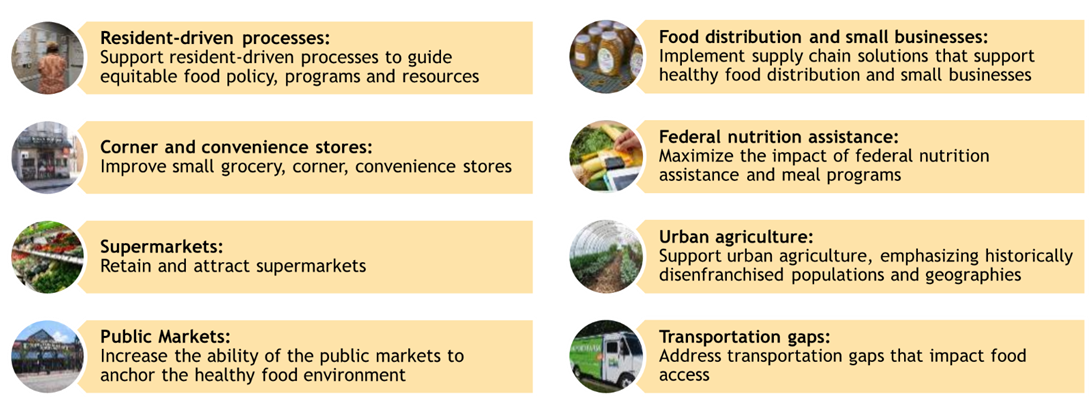Healthy Food Environment Strategy

Across Baltimore City, noteworthy accomplishments in food access have been made by residents, government, non-governmental organizations, academia and the private sector. Yet, there remains significant work to do to ensure all residents have equitable access to healthy affordable food. Building on accomplishments since 2015 and incorporating additional priorities, BFPI has adapted the Food Desert Retail Strategy to be a more comprehensive and inclusive strategy, now called the Healthy Food Environment Strategy. The Healthy Food Environment Strategy addresses aspects of food access beyond food retail including food assistance and food production, as well as the processes necessary to engage stakeholders across the food system. Below are the eight priorities of the Healthy Food Environment Strategy:
1. Support resident-driven processes to guide equitable food policy, priorities and resources: Understanding that truly equitable solutions are established by the people most affected by any problem, BFPI seeks to increase and create additional pathways for resident-driven processes, dialogue and critique.
- Engage Resident Food Equity Advisors in policymaking
- Bolster networks through the Food Policy Action Coalition (Food PAC)
- Support non-governmental and grassroots efforts
2. Improve small grocery, corner and convenience stores: Small stores are already prevalent at the neighborhood level. BFPI seeks solutions to turn more of these stores into healthy food assets.
- Implement RFEA Small Food Retail Recommendations
- Use federal nutrition assistance programs as a framework for increasing healthy food at stores
- Support innovative retail models that generate wealth in historically marginalized communities
3. Retain and attract supermarkets: BFPI works to ensure that existing supermarkets and grocery stores continue to serve Baltimore residents, and works to attract stores to underserved areas.
- Develop funding, incentives and tax credits in Grocery Incentive Areas
- Provide technical assistance to new and existing stores
4. Increase the ability of the public markets to anchor the healthy food environment: Public markets provide a wide variety of food, physical infrastructure and social capital, and anchor the food environment in several neighborhoods without supermarkets.
- Increase the availability and sales of staple foods and healthy prepared food
- Leverage public markets to support small food business
5. Implement supply chain solutions that support healthy food distribution and small businesses: Supply chain practices favor large retailers over small ones because of purchase power differences. BFPI seeks to support scaling up of locally owned businesses and locally produced food, and reduce waste.
- Create structural change in supply chain and distribution
- Adopt Good Food Procurement standards across city government
- Increase food recovery to reduce both food waste and food insecurity
6. Maximize the impact of nutrition assistance and meal programs: Nutrition assistance programs are both a social safety net and economic drivers for food retail in Baltimore City. There are often gaps in the number of residents who are eligible for federal nutrition programs and those who participate, leaving potential funds underutilized, the residents unnecessarily hungry. BFPI works to increase participation and maximize the effectiveness of these programs.
- Increase the impact of SNAP and WIC
- Increase participation in federal meal programs
- Increase impact of food pantries
7. Support urban agriculture, emphasizing historically disenfranchised populations and geographies: With large tracts of vacant and underutilized land, Baltimore incorporates food production into the urban environment. Emphasis should be placed on expanding opportunities for communities of color who have historically experienced discriminatory land-use policies and been excluded from land ownership. Urban farmers need long-term land tenure in terms of decades rather than years.
- Protect and prioritize appropriate parcels of land for agricultural purposes and create a policy environment that encourages food and farm production
- Create better-defined and supported pathways to long-term land tenure and/or ownership of agricultural spaces
- Increase opportunities for growing, buying and selling locally grown and produced products
8. Address transportation gaps that impact food access: Based on national data and qualitative interviews, the majority of Baltimoreans prefer to do the bulk of their grocery shopping at full-service supermarkets. By definition, Healthy Food Priority Areas are in residential areas and not all communities are able to support a full-service supermarket. BFPI has developed transportation strategies to bring people to food and to bring food to people.
- Support the pilot and implementation of Online SNAP benefits
- Make public transit more conducive to food shopping
- Support innovative strategies and organizations creating transit-related solutions